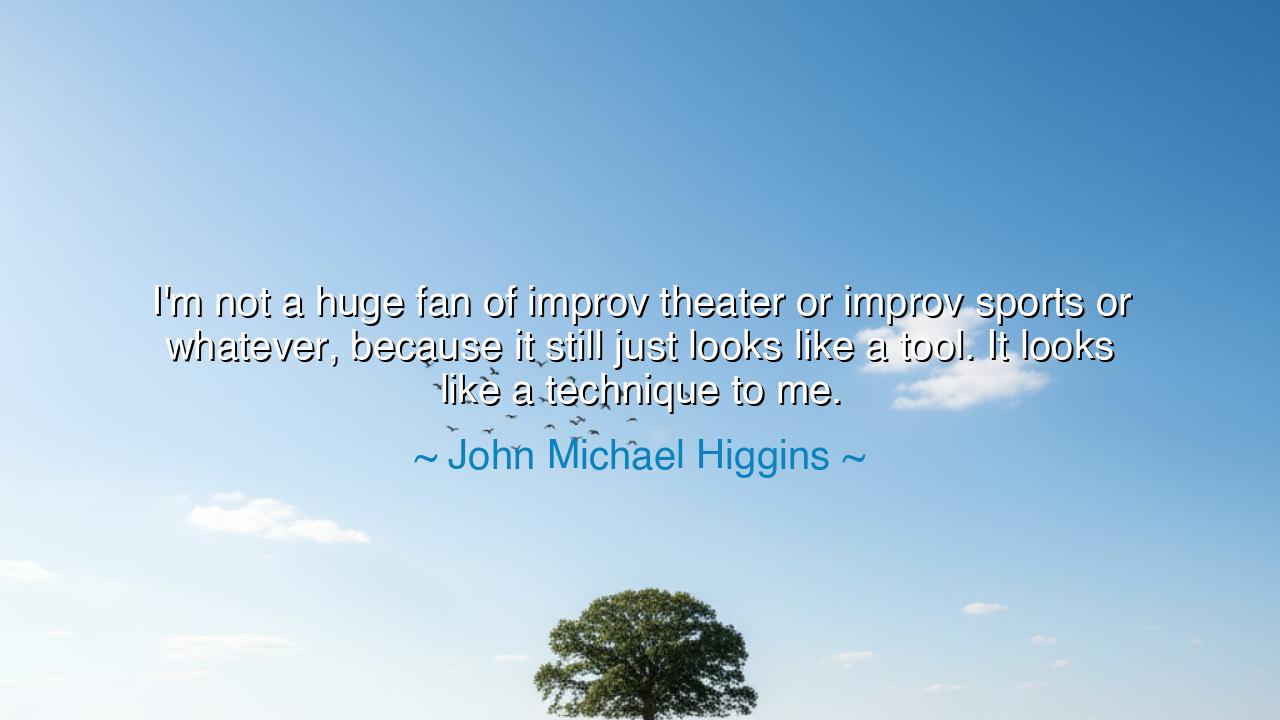
I'm not a huge fan of improv theater or improv sports or
I'm not a huge fan of improv theater or improv sports or whatever, because it still just looks like a tool. It looks like a technique to me.






John Michael Higgins, a man both witty and wise in his craft, once spoke with candor: “I’m not a huge fan of improv theater or improv sports or whatever, because it still just looks like a tool. It looks like a technique to me.” These words, though delivered in the context of performance, strike deeper than the stage. For they remind us that there is a difference between the appearance of life and the essence of it, between the show of skill and the true spirit that breathes through it. Higgins warns us that when art—or life—becomes mere technique, it risks losing its soul.
The origin of this thought lies in the eternal struggle between form and spirit. In the theater of the ancients, the mask and gesture were not the heart of performance, but the vessel through which truth spoke. The same is true of sport, or indeed any craft: the rules, the drills, the tools are necessary, but they are not the final aim. Higgins sees in improv not the living flame of spontaneity but the obvious machinery of practice. He reminds us that when the tool becomes visible, the magic dissolves.
Consider the ancient sculptors of Greece. Their chisels and hammers were crude, yet from them they drew forms of such grace that centuries later we still marvel. But imagine if one gazed upon a statue and thought not of beauty, but only of the marks of the chisel. The tool would overwhelm the vision. Higgins’ words echo this: art and sport, when reduced to technique alone, lose their mystery and become mechanical. The greatness lies not in the tool, but in the spirit that makes the tool invisible.
History gives us many examples. Think of Mozart, who mastered the techniques of composition but never let them appear as naked tricks. His music flows like nature itself—clear, inevitable, alive—so that the listener forgets the artifice and feels only the truth. Contrast this with the many forgotten composers of his time, whose works are technically correct but soulless, weighed down by the obviousness of their craft. Higgins’ observation falls into this same wisdom: true mastery hides its technique so that life itself shines through.
Yet there is also humility in his words. Higgins does not dismiss the tool; he simply refuses to mistake it for the art itself. The swordsmith must know his hammer, the actor his voice, the athlete his drill. But all these are servants of a higher purpose. To dwell too much on them is to be trapped in the workshop, never entering the temple. He speaks as one who has labored long enough in his craft to know that the greatest artistry is not seen, but felt.
The lesson, then, is profound: learn your tools, master your techniques, but do not cling to them. Seek instead the higher aim—the truth, the beauty, the spirit—that the tool is meant to serve. Do not let your life become a display of methods and tricks, for then it will look like technique alone. Instead, strive for that invisible mastery where the tool disappears and only authenticity remains.
Therefore, remember Higgins’ wisdom: whether in theater, in sports, in music, or in the living of life itself, do not be content with showing skill. Let your skill become so natural, so hidden, that what others see is not the machinery of your effort but the living flame of your soul. For when the tool fades into the background, the art—and the life—become eternal.
And so, the teaching endures: technique is the servant, never the master. Cherish it, polish it, but let it vanish in the act of creation, leaving only the truth of who you are and what you bring into the world.






AAdministratorAdministrator
Welcome, honored guests. Please leave a comment, we will respond soon